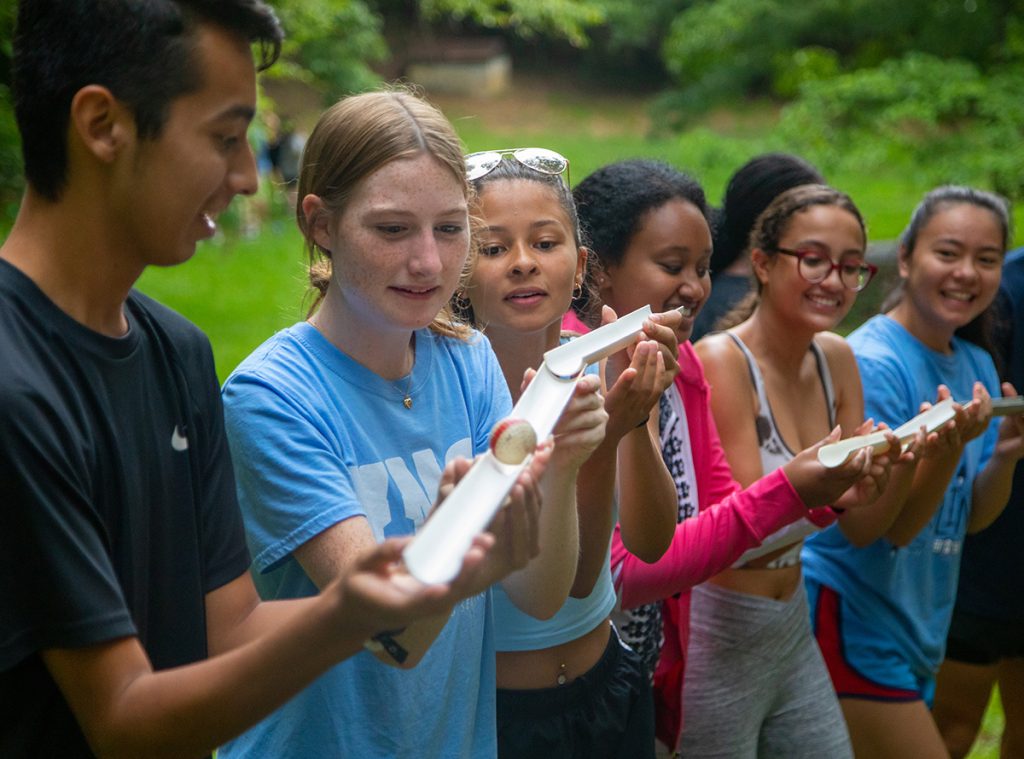About Summer Bridge

What is Summer Bridge?
The Summer Bridge Program is a six-week, transition program that helps incoming, first-year students adjust to Carolina by providing academic enrichment, community building, and co-curricular and experiential learning activities.
Any student who has been admitted to UNC-Chapel Hill and is a North Carolina Resident is eligible to apply. The cost of housing and tuition are covered by the program. All participants receive a stipend that can be used to assist with costs associated with books, on-campus dining options, and other personal expenses.
What to expect?
- ENGL 105 (3 credit hours)
- A choice between EDUC 330/MATH 110/CHEM 100 (3 credit hours)
- IDST 101 (1 credit hour)
- Community-building activities
- Introduction to campus resources
All participants enroll in ENGL105 and choose one of the other three courses for their second option. Enrollment in EDUC 330, MATH 110, or CHEM 100 is determined by placement information and/or major and career interests. All courses fulfill a general education requirement or can count as a prerequisite for advanced STEM courses at Carolina.
More information about mathematics placement can be found by visiting the Department of Mathematics website.
Additionally, all students, with the exception of Honors students, will enroll in IDST 101: College Thriving.
We are considering the possibility of adding MATH 130 (click here for course description) as an option. However, this is contingent on placement eligibility and demand.
Course Descriptions
- ENGL 105 (English Composition and Rhetoric): Introduces students to academic writing across the disciplines of natural sciences, social sciences (or business), and humanities. This course develops advanced writing skills that focus on identifying how genres, styles of writing, arguments, and forms of evidence differ across disciplines, audiences, and purposes. Studying and practicing the conventions of writing in different disciplines will help you become a more versatile writer, which in turn should help you in other college courses.
- EDUC 330 (The Science of Learning): Students study several facets of learning in the modern world, and investigate what scholarship in cognitive psychology, educational psychology, and the learning sciences can do to help us maximize that learning.
- MATH 110 (College Algebra): provides a one-semester review of the basics of algebra. Basic algebraic expressions, functions, exponents, and logarithms are included, with an emphasis on problem solving. This course does not satisfy any general education requirements. It is intended for students who need it as a prerequisite for other classes. A student cannot receive credit for this course after receiving credit for MATH 231 or higher.
- CHEM 100 (Foundations of Chemistry): An introduction to fundamental threshold concepts in chemistry as preparation for the two-course sequence of General Descriptive Chemistry (CHEM 101 and 102). This course emphasizes developing contextualized algebra skills for solving chemistry problems including physical unit conversions, molar mass, and reaction stoichiometry. MATH 110 is a pre-requisite.
- IDST 101 (College Thriving): A required First-Year Foundations course within the IDEAs in Action General Education curriculum. College Thriving empowers students to successfully transition to college, to participate more fully in campus opportunities, and to better recognize the resources available for academic support. We will cover topics including science-based strategies for effective learning, engaging with the campus community, self-care, and wellness.
- MATH 130 (Precalculus Mathematics): Covers the basic mathematical skills needed for learning calculus. Topics are calculating and working with functions and data, introduction to trigonometry, parametric equations, and the conic sections.
Contact
Brittany Grant
Summer Bridge and Carolina Firsts Coordinator
grantbn@live.unc.edu
(919) 843-8697
